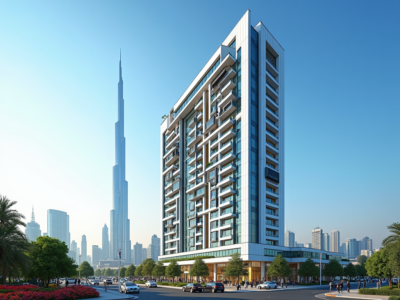Understanding the specific terminology used in UAE mortgage lending is crucial for anyone considering buying property. The UAE mortgage market is diverse, with various terms and conditions that can affect your borrowing experience. This article aims to break down the key terminology used in UAE mortgage lending, helping you navigate the complexities of obtaining a mortgage. By familiarizing yourself with these terms, you will be better prepared to make informed decisions. Whether you’re a first-time buyer or looking to refinance, knowing these terms can save you time and money. Let’s dive into the essential vocabulary and concepts that every potential borrower should know.
Mortgage Lender Types
Como residences Dubai offer various types of mortgage lenders to cater to the diverse needs of potential homebuyers. The two primary types of lenders are:
- Banks: In the UAE, you have both traditional banks and Islamic banks. Traditional banks offer a wide range of mortgage products with varying terms and interest rates. Islamic banks, on the other hand, operate in compliance with Sharia law, offering unique financing options like Murabaha and Ijara.
- Mortgage Brokers: These are intermediaries who can help you find the best mortgage deal by comparing various offers from different lenders. They can provide expert advice and guide you through the application process.
Mortgage Types
Fixed-Rate Mortgages
A fixed-rate mortgage is a type of home loan where the interest rate remains constant throughout the term of the loan. This offers predictability and stability, as your monthly payments will not change. It is ideal for borrowers who prefer a consistent payment schedule. However, fixed-rate mortgages often come with higher initial interest rates compared to variable-rate options. It is essential to weigh the pros and cons before choosing this type of mortgage.
Variable-Rate Mortgages
Variable-rate mortgages, also known as adjustable-rate mortgages (ARMs), have interest rates that fluctuate based on market conditions. Initially, these mortgages may offer lower interest rates compared to fixed-rate loans. However, they come with the risk of rate increases over time. Borrowers need to be financially prepared for potential variations in their monthly payments. This type of mortgage can be appealing for short-term property investments or for those who expect interest rates to decrease.
Loan-to-Value (LTV) Ratio
Loan-to-Value (LTV) ratio is a critical metric in mortgage lending that compares the loan amount to the property’s appraised value. It is calculated by dividing the loan amount by the appraised property value, then expressed as a percentage. For example, if you’re purchasing a property valued at AED 1,000,000 with a loan of AED 800,000, the LTV ratio would be 80%. Lenders use LTV ratios to assess the risk level of a mortgage. Higher LTV ratios usually mean higher interest rates and stricter lending conditions.

Down Payments
In the UAE, standard down payment requirements vary, but typically range from 20% to 25% of the property’s purchase price. First-time buyers may have slightly different requirements, often benefiting from lower down payment rates. A higher down payment can reduce the loan amount needed and may result in better interest rates. It’s essential to plan your finances to meet these requirements. Be aware of differences between down payment expectations for locals versus expatriates.
Interest Rates
Interest rates in the UAE mortgage market can be either fixed or variable. Fixed interest rates remain the same throughout the loan term, offering stability in monthly payments. On the other hand, variable interest rates fluctuate based on market conditions, potentially leading to lower initial costs. Understanding the structure of interest rates helps you choose the best mortgage option for your financial situation. It’s advisable to consult with financial experts to get the best deal.
Common Fees and Charges
When applying for a mortgage in the UAE, it is important to be aware of various fees and charges that may be incurred throughout the process. These fees can add up, so it’s essential to budget accordingly.
| Fee Type | Description | Typical Cost |
|---|---|---|
| Origination Fees | Charges by the lender for processing the loan application | 1% – 2% of loan amount |
| Appraisal Fees | Cost of assessing the property’s market value | AED 2,000 – AED 3,000 |
| Early Repayment Fees | Penalties for repaying the loan ahead of schedule | 1% – 3% of outstanding balance |
Insurance Requirements
Insurance is a mandatory requirement for obtaining a mortgage in the UAE. The two primary types of insurance are:
- Property Insurance: This insurance covers damage to the property and is essential for securing the mortgage. The cost of property insurance varies based on the property’s value and location.
- Life Insurance: Mortgage lenders typically require life insurance to protect both the borrower and the lender. This insurance ensures that the loan is repaid in case of the borrower’s untimely death. Life insurance premiums are calculated based on the borrower’s age, health, and loan amount.
Key Application Terms
Pre-approval
Pre-approval is an initial evaluation by a lender to determine the loan amount you’re qualified for. It involves reviewing your financial situation, credit history, and employment status. Getting pre-approved can give you a competitive edge when making an offer on a property. It also helps you understand your borrowing capacity and budget more effectively. In the UAE, pre-approvals are typically valid for 60 to 90 days. It’s advisable to seek pre-approval before beginning your property search.
Credit Scores
Your credit score is a numerical representation of your creditworthiness, and it significantly impacts your mortgage approval chances. Lenders in the UAE use credit scores to assess the risk of lending to you. A higher credit score can lead to better interest rates and terms, while a lower score may result in higher rates or even loan denial. Regularly checking and improving your credit score can enhance your mortgage application prospects. Ensure all your financial dealings are transparent and timely to maintain a good credit score.
Documentation
Documentation is a crucial part of the mortgage application process. Standard documents required include:
- Proof of Identity: Passport and Emirates ID for residents and nationals.
- Proof of Income: Salary certificate, bank statements, and tax returns.
- Proof of Residency: Utility bills and tenancy contracts.
- Property Documents: Title deed, property valuation, and sales agreement.
Ensuring all your documents are in order can expedite the mortgage approval process. It’s advisable to consult with your lender to get a complete list of required documents.
Repayment Terms
Understanding the repayment terms of your mortgage is essential for financial planning. The two common repayment terms are:
- Amortization Schedule: This is a detailed breakdown of your loan’s repayment schedule, showing the monthly payments required to pay off the loan over its term. It includes the principal and interest components of each payment.
- Balloon Payments: These are significant, lump-sum payments due at the end of a loan term. They are common in short-term mortgage agreements and can significantly impact your financial planning. Being prepared for these payments ensures you won’t face unexpected financial strain.

Conclusion
Understanding the terminology used in UAE mortgage lending is crucial for making informed decisions. By familiarizing yourself with the key terms and concepts discussed in this article, you can navigate the mortgage process more efficiently. It is essential for borrowers to conduct thorough research and seek professional advice. Whether you’re looking to purchase a property in Como Residences Dubai or elsewhere, being well-informed will help you secure the best mortgage deals. Remember, knowledge is power when it comes to financial commitments. Take the time to understand and evaluate all aspects of your mortgage.
Frequently Asked Questions
1. What is the typical down payment required for a mortgage in the UAE?
Typically, the down payment required ranges from 20% to 25% of the property’s purchase price, though first-time buyers may sometimes have different requirements.
2. How is the interest rate for a mortgage determined in the UAE?
Interest rates are determined based on the type of loan, the borrowing amount, the borrower’s creditworthiness, and prevailing market rates.
3. Can expatriates get mortgage loans in the UAE?
Yes, expatriates can get mortgage loans in the UAE, but terms and conditions may vary significantly between lenders.
4. What happens if I repay my mortgage early in the UAE?
Early repayment may incur penalties known as early repayment fees, which are typically a percentage of the outstanding loan balance.
5. Is mortgage insurance mandatory in the UAE?
Yes, both property insurance and life insurance are usually mandatory to protect both the borrower and the lender in case of unforeseen circumstances.




